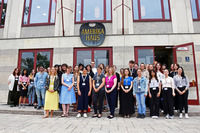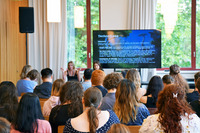Student Projects
BAA-Student Workshop “Questions of Ecology”
 In July 2024, the “Questions of Ecology” student workshop took place at the Amerikahaus Munich as part of the annual BAA seminar. Over two days, the three groups of the respective courses at the University of Augsburg, FAU Erlangen-Nürnberg and LMU met to discuss their research results and jointly developed discussion questions. Looking at, “Questions of Ecology,” this year’s event focused on the connection between environmental humanities and literary and cultural studies and gave a broad overview on the topic. Discussions ranged from post-apocalyptic narratives, the treatment of toxicity in literature, and questions about publics in literature and culture.
In July 2024, the “Questions of Ecology” student workshop took place at the Amerikahaus Munich as part of the annual BAA seminar. Over two days, the three groups of the respective courses at the University of Augsburg, FAU Erlangen-Nürnberg and LMU met to discuss their research results and jointly developed discussion questions. Looking at, “Questions of Ecology,” this year’s event focused on the connection between environmental humanities and literary and cultural studies and gave a broad overview on the topic. Discussions ranged from post-apocalyptic narratives, the treatment of toxicity in literature, and questions about publics in literature and culture.
 The workshop was sponsored by the Bavarian America Academy and financially supported by the University of Augsburg, FAU and LMU. The event was organized by Ina Batzke (Augsburg), Isabel Kalous (Erlangen-Nürnberg) and Nicole Schneider (LMU).
The workshop was sponsored by the Bavarian America Academy and financially supported by the University of Augsburg, FAU and LMU. The event was organized by Ina Batzke (Augsburg), Isabel Kalous (Erlangen-Nürnberg) and Nicole Schneider (LMU).
Images sources: Bayerische Amerika-Akademie/Christoph Straub 2024
"Goddam Dangerous" — On Tour
In July 2023 students and faculty of the Amerika-Institut performed "Goddam Dangerous" — A Stage Reading of Historical Documents on the Cuban Missile Crisis in Jena and Berlin.
After two performances in Munich, our stage reading "Goddam Dangerous" traveled to Jena and Berlin to have a look behind the curtain of these fateful days in October 1962!
Jena: Sunday, July 2, 6:30pm, Astoria Hörsaal der FSU, Unterm Markt 8, 07743 Jena
Berlin: Monday, July 3, 6.30pm, Hörsaal 1b der Freien Universität Berlin, Rostlaube, Habelschwerdter Allee 45
The stage reading offers a glance behind the scenes of the fateful days in October 1962. Under the direction of Alexandra Schenke, a historian at the Amerika-Institut of LMU Munich with degrees in acting and film, students of the Amerika-Institut will simulate some of the tensest moments and exchanges of the crisis. The stage reading, conceived in collaboration with Dr. Andreas Etges, is based on excerpts from speeches and letters by John F. Kennedy, Nikita Khrushchev, and Fidel Castro, secret recordings of Kennedy’s crisis team and other primary sources. Reimagined and respoken, they will be brought to life on stage within a framework of classic theater and multimedia elements, providing a special experience of this historical event 60 years later.
“Goddam Dangerous” 60 Years Later: The Cuban Missile Crisis Revisited
An Exhibit and Theater Project at Amerikahaus München
60 years ago, in October 1962, the Cuban Missile Crisis brought the world to the brink of a nuclear war. The declassification of many secret primary sources in the past decades makes it possible to provide a much more accurate description and a deeper context of these decisive “Thirteen Days.” President John F. Kennedy and Soviet leader Nikita Khrushchev, who bear some responsibility for the dangerous crisis, tried to avoid a nuclear confrontation at all costs. They learned crucial lessons, started to build trust, and worked on détente agreements.
The Cuban Missile Crisis not only signifies the most dangerous confrontation during the Cold War, but can also help to learn about crisis management and crisis resolution that are once again of special relevance today.
The exhibition was curated by students of the Amerika-Institut of LMU under the direction of historian Dr. Andreas Etges, a leading expert on the Kennedy presidency, and Alexandra Schenke, in cooperation with Amerikahaus München and the Museum Berlin-Karlshorst.
The exhibition will be shown at Amerikahaus München from October 15 through December, 23, 2022.
Exhibition Website
Twitter Feed @GoddamDangerous
Transatlantic Studies Student Projects
(PD Dr. Charlotte Lerg, Dr. Andreas Etges)
A Student Research Blog offers the opportunity for students form the BA and MA programs at our Amerika-Institut to publish their work and research on transatlantic relations. Two online projects created by BA and MA students of the Amerika-Institut during the Sommersemester 2020 are now online:
https://transatlanticmoment.wordpress.com
Transatlantic Post War Moment
Culturally and historically the Post-War Moment was pivotal for transatlantic relations. An MA research seminar looked at this phenomenon a little closer.
Marshall Plan Films
The Marshall Plan is often regarded as a particularly successful aid program that also helped create a strong Transatlantic bond. As part of Independent Study Projects, four BA students analyzed select films produced to sell the Marshall Plan to European audiences.

